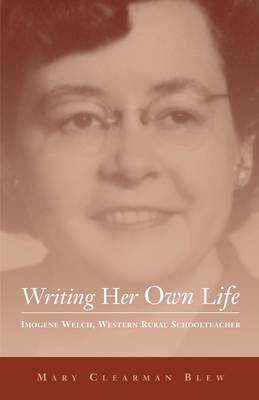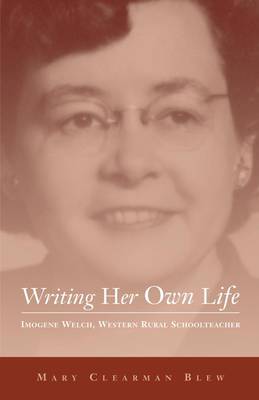
- Afhalen na 1 uur in een winkel met voorraad
- Gratis thuislevering in België vanaf € 30
- Ruim aanbod met 7 miljoen producten
- Afhalen na 1 uur in een winkel met voorraad
- Gratis thuislevering in België vanaf € 30
- Ruim aanbod met 7 miljoen producten
Omschrijving
Mary Clearman Blew's aunt Imogene Welch embodied the hard-working values of depression-era western America. In Writing Her Own Life, Blew builds a narrative around excerpts from the diaries Imogene kept during World War II while she taught in rural Montana schools and later in Washington State. Through her diary entries we learn of the war's effects on Imogene as she moved from rural, family-centered life in Montana to independent if somewhat lonelier life in Washington State.
After growing up on an impoverished homestead in Montana, Imogene enjoyed the modest comforts of living in a small town in Washington, including electricity and running water. And she experienced the dramatic changes in a school system under stress from the war: separated families, crowded classrooms, and an increasingly mobile population. Imogene's diaries find her exploring a new landscape, worrying about distant friends and family, coping with her newfangled automobile, enduring roommates, and eventually learning to cherish her independence.
Blew explores the transitional experiences of the young schoolteacher and examines traditional and non-traditional ways in which fiction and creative nonfiction recreate the life recorded in the diaries. Moving beyond Imogene's experiences, Blew asks what an inheritance of family stories and text means to a generation of readers who are experiencing transitions different from Imogene's but no less intense.
Specificaties
Betrokkenen
- Auteur(s):
- Uitgeverij:
Inhoud
- Aantal bladzijden:
- 272
- Taal:
- Engels
- Reeks:
- Reeksnummer:
- nr. 14
Eigenschappen
- Productcode (EAN):
- 9780806135816
- Verschijningsdatum:
- 7/06/2004
- Uitvoering:
- Hardcover
- Formaat:
- Genaaid
- Afmetingen:
- 148 mm x 225 mm
- Gewicht:
- 417 g

Alleen bij Standaard Boekhandel
Beoordelingen
We publiceren alleen reviews die voldoen aan de voorwaarden voor reviews. Bekijk onze voorwaarden voor reviews.











